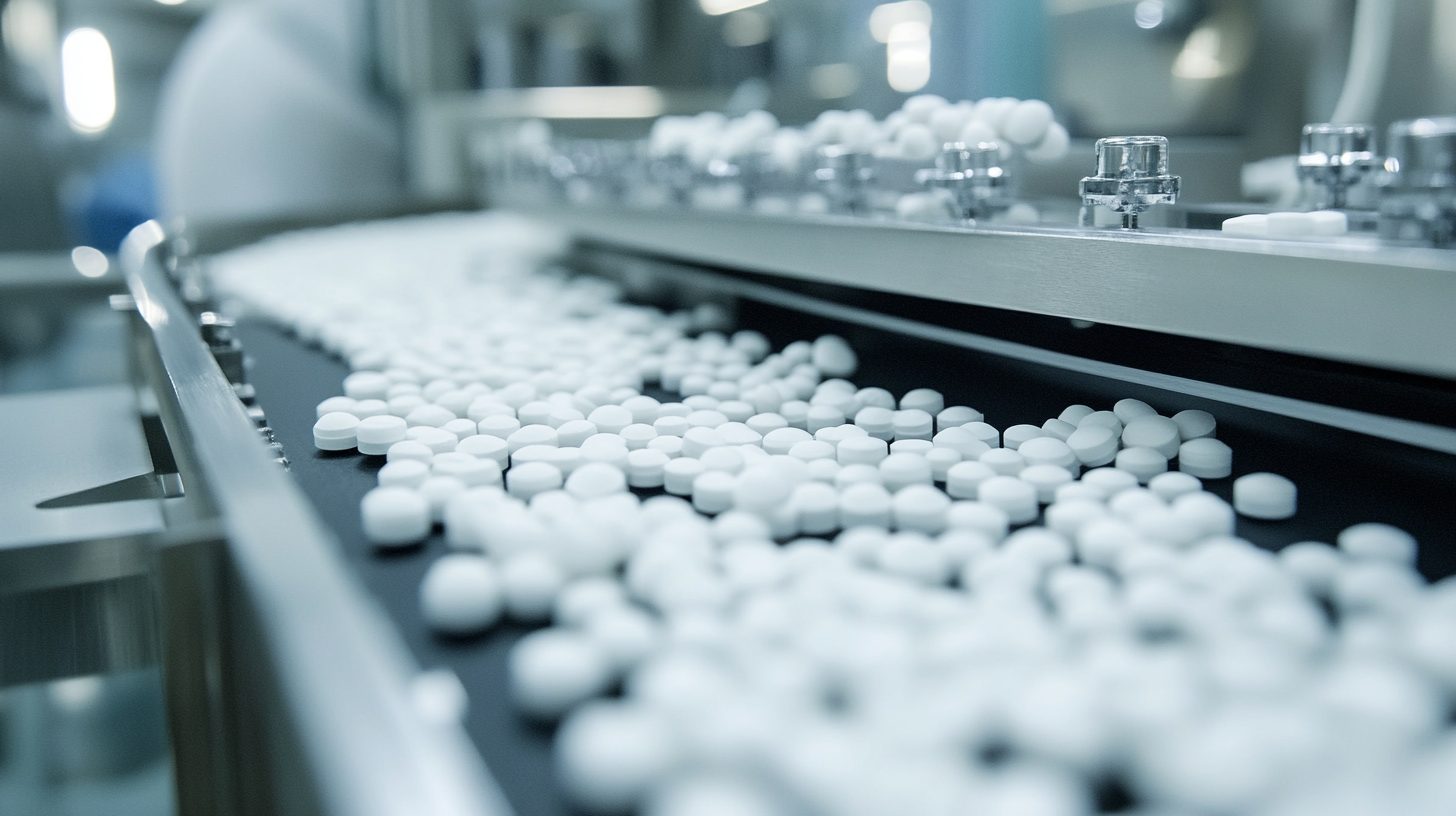
Unlocking the Future of Biopharmaceuticals with Peptide Materials in Global Supply Chains
The biopharmaceutical industry has recently experienced a transformational change in the area of peptide materials, which are transforming drug development and delivery. The latest ResearchAndMarkets report estimates that the global peptide therapeutics market will reach USD 51.08 billion by 2028, growing at a cagr of 7.1%. This growth is attributed to various unique properties associated with peptide materials. They facilitate patient-targeted therapies with high specificity against a wide range of diseases, from cancer to metabolic disorders. Moreover, their incorporation into supply chains globally has emerged as an essential factor for ensuring the quality and compliance with regulations, which is finally leading to patient benefit.
The manufacturers understood the potential of peptide materials in the effective formulation and delivery of drugs as biopharmaceuticals are becoming innovative with increasing demands for their use at home and abroad. The World Health Organization asserts that up to 75% of drugs are biologic-based today. As peptide therapies emerge at the core of this transformation, unlocking their potential within global value chains may move production efficiency and quickly respond to the healthcare market's rapid changes. This blog will indicate how peptide material has a promising future for biopharmaceuticals while outlining hurdles in today's globalized economy regarding supply chain management.
Above 75% of exports today by WHO are biologics, and peptide-based therapies are at the heart of this revolution. Unlocking the potential of peptide products in the context of global supply chains enables companies to gain production efficiencies and respond rapidly to the fast-changing requirements of the health care market. The manufacturers understood the potential of peptide materials in the effective formulation and delivery of drugs as biopharmaceuticals are becoming more innovative with increasing demand from home and foreign markets. This blog will elucidate the promising future of peptide material for biopharmaceuticals while stating the supply chain issues being faced in the contemporary globalized economy.

The Role of Peptide Materials in Advancing Biopharmaceutical Innovation
Peptide materials will transform the biopharmaceutical industry as a foundation for innovation and development. Recently released reports from the Global Peptide Therapeutics Market indicate that the market is estimated to reach nearly USD 33.6 billion in 2027, growing steadily at a CAGR of 6.9%. At this rate, the growing demand for peptide-based therapies meetings a variety of health challenges-from cancer, diabetes, and autoimmune is clear. The versatility of peptide materials presents opportunities for the fabrication of targeted drug delivery systems that enhance therapeutic efficacy and safety. For example, innovations in solid-phase peptide synthesis (SPPS) have facilitated the production of complex peptides in order to significantly reduce time-to-market for new drugs. According to an IQVIA Institute for Human Data Science report, the steady rise in peptide drug approvals by regulatory authorities stands established across the years, with 33 peptide therapeutics approved between 2015 and 2020 alone, consolidating the momentum in peptide innovation. Furthermore, peptide materials streamline global supply chains so as to make optimal production while providing a pathway to scale up novel treatment options being conceived. For novel treatment options being conceived, companies taking advantage of advanced bioprocessing technologies find that increasing yield and purity of the products will help drive down costs and ensure accessibility to that product. Grand View Research clearly highlights that companies dealing with biopharmaceuticals utilizing peptide technologies will attract a good share of the market, thus underlining the strategic importance of these materials in propelling healthcare solutions across the globe.

Enhancing Global Supply Chain Efficiency Through Peptide Integration
The introduction of peptide materials into global supply chains is expected to change the biopharmaceutical industry owing to tremendous economic pressure. According to recent literature-published analyses, including the Global Peptide Therapeutics Market analysis carried out by industry experts-the peptide market is projected to grow at a CAGR of 8.5% from 2021 to 2028, owing to increasing demand for more targeted and effective therapies. These indicators render pharmaceutical supply chains highly inefficient and in need of innovation so the rising demands of the market can be effectively met.
For the most part, peptide drugs are more advantageous than traditional small-molecule drugs, benefitting from higher specificity and less side-effect profile. As noted in the Biomaterials Market Research report, peptide therapeutics comprise about 57% of the market share for new biopharmaceuticals expected over the coming years. Companies can use peptide materials all through an improved supply chain environment to not only raise their product quality but also to enhance the entire manufacturing process, achieving a unique opportunity of reducing the potential time-to-market by 25-30%.
Adoption of such peptide integrations in supply chains should, therefore, lead to the reduction of costs. Pharmaceutical Supply Chain Institute, for instance, has been quite sensitized to the implementation of advanced sourcing strategies toward peptides, which would decrease costs of procurement by about 15%. These cost advantages and better therapeutic outcomes will be an obstacle to change for biopharmaceutical firms to quickly adapt to a shifting marketplace.

The Advantages of Peptide-Based Drug Development in Modern Medicine
Peptide drug development has surfaced as a revolutionary approach within modern medicine, with several noteworthy advantages when compared to conventional small molecules. According to Research and Markets, the global peptide therapeutics market will reach $57.7 billion by 2025, with a projected CAGR of 7.9% during the 2020-2025 period. This expansion will be spurred on further by the increasing awareness of peptides as prospective therapeutic agents due to their specificity, potency, and lesser side effects.
One impressive feature of peptide drugs is that they interact .with biological targets almost exclusively, producing comparatively less adverse reactions when juxtaposed with traditional pharmaceuticals. As elaborated in an article in "Nature Reviews Drug Discovery," peptides can be engineered to act like particular snoozes in biological pathways, producing novel treatments for a variety of conditions, including cancer and autoimmune diseases. Peptides are also easier to synthesize and alter, allowing rapid optimization for drug development.
Another important factor responsible for the propulsion of peptide therapeutics is their exploitation in targeted drug delivery systems. Peptide engineering for specific cellular targeting massively contributes to therapeutic efficacy. Data received from the Peptide Therapeutics Foundation indicate that 80% of new drug candidates are peptides, marking a steadily growing importance for peptides in the pharmaceutical universe. In parallel with developments in peptide synthesis and purification technology, these concerning peptide production scalability are becoming practical and might thus provide very robust and reliable supply chains for the biopharmaceutical industry in the near future.

Sustainable Practices in Peptide Sourcing and Manufacturing for Biopharmaceuticals
As the biopharmaceutical industry continues to seek ways to minimize its environmental impact, sustainable practices are getting increasing importance in peptide sourcing and manufacturing. Real-time monitoring using Raman spectroscopy and rotating-bed reactors signify the industry's recent efforts at sustainability in solid-phase peptide synthesis. These modern techniques not only seek to optimize the synthesis but also minimize waste and energy consumption, thus responding to the increasing demands for eco-friendly production methods.
Sustainable partnerships further demonstrate efforts toward peptide purification processes, such as those centered on acetonitrile solvent recovery technologies. Manufacturers reclaiming solvents will reduce operational costs and environmental nuisance due to conventional modes of peptide synthesis. This reflects a shift toward greener practices on a broader scale within the biopharmaceutical realm, including integrating sustainability into their supply chains.
Also, biomanufacturing avenues harnessing plant-based sources indicate the sustainability integration potential within peptide-based pharmaceuticals. For instance, employing Nicotiana benthamiana plants in the formation of GLP-1 receptor agonists serves as an example of biotechnology capable of delivering viable therapeutic solutions consistent with the sustainable development goals. As the peptide therapeutics market is expected to reach USD 81.48 billion by 2035, the sustainability discourse will remain a major influence in determining the future of biopharmaceuticals.
Future Trends in Peptide Research and Their Impact on Healthcare Systems
Development in the healthcare sector is witnessing great advancement with peptide materials being at the forefront of biopharmaceutical technology. Recent research estimates that the global peptide therapeutics market will amount to around $39 billion in 2026, growing at approximately 9.8% from 2021 CAGR. This increase is mainly driven by the growing number of chronic diseases because peptides have become an important form of treatment due to their specific structures compared to traditional drugs and their low side effects.
Indeed, some of the new developments in the field of peptides are expected to have significant effects on the health care system as well. Possible future advances, including artificial intelligence along with high-throughput screening, will hasten the discovery and development of new peptides. For instance, arbitrary AI-driven platforms analyze massive data to identify peptide sequences that could serve as the heart of a new class of therapeutics designed to treat such complex diseases as cancer and diabetes. These advanced technologies promise to significantly reduce the time between discovery and the marketplace for therapies based on peptides, adding more cutting-edge treatments within reach of patients.
In addition, personalized medicine is changing the landscape of peptide use in health care. New classes of peptide therapies will be able to be designed specifically for individual patient's profiles, thus maximizing treatment efficiency. Personalized peptides are likely to play a greater role in oncology and immunology by providing targeted and effective treatment options that improve outcomes in patients, according to the American Peptide Society. Health care systems will have to prepare themselves to cope with the challenges posed by personalized peptide-based therapies as they become more mainstream.
